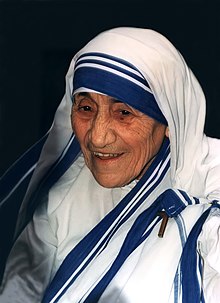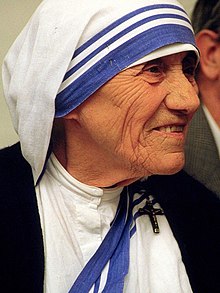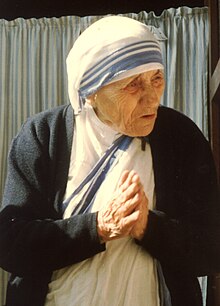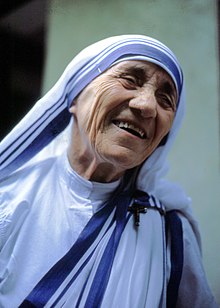Mother Teresa
Appearance

Saint Mother Teresa, also known as Saint Teresa of Calcutta (26 August 1910 – 5 September 1997), born Anjezë Gonxha Bojaxhiu, was an Albanian-born Indian citizen, Roman Catholic Sister, and Nobel Peace Prize winner.
Quotes
[edit]
1950s
[edit]- If you judge people, you have no time to love them.[1]
- My own Jesus,
They say people in hell suffer eternal pain because of the loss of God – they would go through all that suffering if they had just a little hope of possessing God. In my soul I feel just that terrible pain of loss, of God not wanting me, of God not being God, of God not really existing (Jesus, please forgive my blasphemies, I have been told to write everything). That darkness that surrounds me on all sides. I can’t lift my soul to God – no light or inspiration enters my soul. I speak of love for souls, of tender love for God, words pass through my words [sic, lips], and I long with a deep longing to believe in them! What do I labour for? If there be no God—there can be no soul.—If there is no soul then Jesus—You also are not true... Jesus don't let my soul be deceived—nor let me deceive anyone. In the call You said that I would have to suffer much.—Ten years—my Jesus, You have done to me according to Your will—and Jesus hear my prayer—if this pleases You—if my pain and suffering—my darkness and separation gives You a drop of consolation—my own Jesus, do with me as You wish—as long as You wish, without a single glance at my feelings and pain... I beg of You only one thing—please do not take the trouble to return soon.—I am ready to wait for You for all eternity.- On her dark night of spiritual desolation amidst devotion, in a letter addressed to Jesus, as quoted in Mother Teresa: Come Be My Light (2007) edited by Father Brian Kolodiejchuk, p. 192; regarding this quote, Fr. Kolodiejchuk writes: "...when addressing Jesus — that is, in prayer — she could express herself with ease. Fufilling her confessor's request, she sent to him a letter addressed to Jesus, enclosing it with her letter dated September 3, 1959." [2]
1960s
[edit]- Often I wonder what does really God get from me in this state — no faith, no love — not even in feelings. The other day I can't tell you how bad I felt. — There was a moment when I nearly refused to accept. — Deliberately I took the Rosary and very slowly and without even meditating or thinking – I said it slowly and calmly. The moment passed — but the darkness is so dark, and the pain is so painful. – But I accept whatever He gives and I give whatever He takes. People say they are drawn closer to God — seeing my strong faith. – is this not deceiving people? Every time I have wanted to tell the truth – “that I have no faith” – the words just do not come – my mouth remains closed. – And yet I still keep on smiling at God and all.
- On her dark night of spiritual desolation amidst devotion, in a letter to Bishop Lawrence Trevor Picachy (September 1962), as quoted in Mother Teresa: Come Be My Light (2009) by Brian Kolodiejchuk, 2009, p. 238 ISBN 0307589234 ISBN 9780307589231
1970s
[edit]
- The biggest disease today is not leprosy or tuberculosis, but rather the feeling of being unwanted.
- As quoted by Malcolm Muggeridge in Something Beautiful for God (1971)
- I try to give to the poor people for love what the rich could get for money. No. I wouldn't touch a leper for a thousand pounds; yet I willingly cure him for the love of God.
- In: Malcolm Muggeridge, Mother Teresa of Calcutta, A Gift For God: Prayers and Meditations, New York: Harper & Row, 1975. p. 61; Cited in: M. Dhavamony. "Mother Teresa's mission of love for the poor" in: Studia missionalia, Vol 39. (1990), p. 137
- I see God in every human being. When I wash the leper's wounds, I feel I am nursing the Lord himself. Is it not a beautiful experience?
- Statement of 1977, as quoted in Concise Oxford Dictionary of Quotations (2011) by Susan Ratcliffe, p. 373
- People are happier. There are more jobs. There are no strikes.
- Mother Teresa in Emergency Rule period, 1975-77; quoted in: David Aikman (1998), Great souls: six who changed the century, p. 244
- Jesus has a very special love for you. As for me, the silence and emptiness is so great that I look and do not see, listen and do not hear. The tongue moves but does not speak.
- Letter to Michael van der Peet (September 1979), quoted in "Mother Teresa Did Not Feel Christ's Presence for Last Half of Her Life, Letters Reveal", Fox News (24 August 2007)
- I was amazed when I learned that in the West so many young people are on drugs. I tried to understand the reason for this. Why? The answer is, “because in the family there is nobody who cares about them.” Fathers and mothers are so busy they have no time. Young parents work, and the child lives in the street and goes his own way. We speak of peace. These are the things that threaten peace. I think that today peace is threatened by abortion, too, which is a true war, the direct killing of a child by its own mother. In the Bible we read that God clearly said: “Even though a mother did forget her infant, I will not forget him.”Today, abortion is the worst evil, and the greatest enemy of peace. We who are here today were wanted by our parents. We would not be here if our parents had not wanted us.We want children, and we love them. But what about the other millions? Many are concerned about the children, like those in Africa, who die in great numbers either from hunger or for other reasons. But millions of children die intentionally, by the will of their mothers. Because if a mother can kill her own child, what will prevent us from killing ourselves, or one another? Nothing.
- When receiving the Nobel peace price in 1979. As quoted from Hitchens, C. (2012). The missionary position: Mother Theresa in theory and practice.
1980s
[edit]
- I have found the paradox that if I love until it hurts, then there is no hurt, but only more love.
- As quoted in Love Until It Hurts: A Tribute to Mother Teresa and the work of the men and women of the Missionaries of Charity (1980) by Daphne Rae
- From now on you must pray for your people and yourself three times a day.
- Remarks to Mengistu Haile Mariam during the 1984-85 Ethiopian famine, as quoted by Dawit Wolde Giorgis in Red Tears: War, Famine and Revolution in Ethiopia, (The Red Sea Press Inc. 1989), p. 213
- We are misunderstood, we are misrepresented, we are misreported. We are not nurses, we are not doctors, we are not teachers, we are not social workers. We are religious, we are religious, we are religious.
- As quoted in Angelo Devananda, Daily Prayers with Mother Teresa (Fount, 1987), p. 91
- Love is a fruit in season at all times, and within reach of every hand. Anyone may gather it and no limit is set. Everyone can reach this love through meditation, spirit of prayer, and sacrifice, by an intense inner life.
- As quoted in Love, A Fruit Always In Season : Daily Meditations from the Words of Mother Teresa of Calcutta (1987) edited by Dorothy S. Hunt
- Do not wait for leaders; do it alone, person to person.
- Mary Alice Warner, Dayna Beilenson (1987) Women of faith and spirit: their words & thoughts, p. 42
- Be kind to each other in your homes. Be kind to those who surround you. I prefer that you make mistakes in kindness rather than that you work miracles in unkindness. Often just for one word, one look, one quick action, and darkness fills the heart of the one we love.
- Quoted in: Charlotte Gray. Mother Teresa: Her Mission to Serve God by Caring for the Poor. G. Stevens, (1988), p. 53
- I don't know what to say since I don't know what is happening [in Albania]. I can say only one thing. My Albanian people are always in my heart. I pray very much to our Lord that His peace may come to our hearts, in our families and in all the world. I pray for Albania, that the Lord may help its leaders to see clearly because if they want to live in peace, they should love one another.
- As quoted in Louis Zanga "Mother Teresa's visit to Albania", Radio Free Europe Research, (23 August 1989)
- The hunger for love is much more difficult to remove than the hunger for bread.
- Interview by Edward W. Desmond in TIME magazine (4 December 1989)
- We are called upon not to be successful, but to be faithful.
- To Navin Chawla, her authorized biographer, as reported in a speech of tribute delivered at UNESCO on the centenary of her birthday, in Paris. [3]
1990s
[edit]



- I've never seen the poor people being so familiar with their head of state as they were with her. It was a beautiful lesson for me.
- On meeting Michèle Duvalier, quoted by Christopher Hitchens in The Missionary Position, (Verso, 1995), page 5
- I think it is very beautiful for the poor to accept their lot, to share it with the passion of Christ. I think the world is being much helped by the suffering of the poor people.
- As quoted by Christopher Hitchens in The Missionary Position, (Verso, 1995), page 11
- I do not know anything about Charles Keating's work or his business or the matters you are dealing with. I only know he has been kind and generous to God's poor, and always ready to help whenever there was a need... Whenever someone asks me to speak to a judge, I always tell them to pray, to look into [their] heart, and to do what Jesus would do in that circumstance. And this is what I am asking of you, your Honor.
- Letter to Judge Lance Ito, requesting clemency for Charles Keating (January 18 1992), as quoted by Christopher Hitchens in The Missionary Position, (Verso, 1995), page 67
- I've always said we should help a Hindu become a better Hindu, a Muslim become a better Muslim, a Catholic become a better Catholic.
- A Simple Path, compiled by Lucinda Vardey (Ballantine Books, 1995), page 31
- I am so pleased with all the good work you are doing for world peace and for people in so many countries. May we continue to work together and to share together all for the glory of God and for the good of man.
- To Sri Chinmoy, as quoted in The Wings of Joy : Finding Your Path to Inner Peace (1997) by Sri Chinmoy
- Spread love everywhere you go; first of all in your house. Give love to your children, to your wife or husband, to a next door neighbor. Let no one ever come to you without leaving better and happier. Be the living expression of God's kindness; kindness in your face, kindness in your eyes, kindness in your smile.
- As quoted in Worldwide Laws of Life : 200 Eternal Spiritual Principles (1998) by John Templeton, p. 448
2000s
[edit]
- We ourselves feel that what we are doing is just a drop in the ocean. But if the drop was not in the ocean, I think the ocean would be less because of the missing drop.
- As quoted in Mother Teresa's Reaching Out In Love - Stories told by Mother Teresa, Compiled and Edited by Edward Le Joly and Jaya Chaliha, Barnes & Noble, 2002, p. 122
- I do not agree with a big way of doing things. What matters is the individual. If we wait till we get numbers, then we will be lost in the numbers and we will never be able to show that love and respect for the person.
- As quoted in Mother Teresa's Reaching Out In Love - Stories told by Mother Teresa, Compiled and Edited by Edward Le Joly and Jaya Chaliha, Barnes & Noble, 2002, p. 122
- I am not sure exactly what heaven will be like, but I do know that when we die and it comes time for God to judge us, He will not ask, "How many good things have you done in your life?," rather He will ask, "How much love did you put into what you did?
- Quoted in: Honor Books, W. B. Freeman (2004), God's Little Devotional Book for Girls, p. 205
- If I ever become a Saint — I surely be one of "darkness". I will continually be absent from Heaven — to light the light of those in darkness on earth.
- As quoted in Mother Teresa: Come Be My Light (2007) by Brian Kolodiejchuk
- Don't look for big things, just do small things with great love....The smaller the thing, the greater must be our love.
- As quoted in Mother Teresa: Come Be My Light (2007) by Brian Kolodiejchuk
- Lord, my God, who am I that You should forsake me? The Child of your Love–and now become as the most hated one–the one–You have thrown away as unwanted–unloved. I call, I cling, I want–and there is no One to answer–no One on Whom I can cling–no, No One.–Alone … Where is my Faith–even deep down right in there is nothing, but emptiness & darkness–My God–how painful is this unknown pain–I have no Faith–I dare not utter the words & thoughts that crowd in my heart–& make me suffer untold agony. So many unanswered questions live within me afraid to uncover them–because of the blasphemy–If there be God –please forgive me–When I try to raise my thoughts to Heaven–there is such convicting emptiness that those very thoughts return like sharp knives & hurt my very soul.–I am told God loves me–and yet the reality of darkness & coldness & emptiness is so great that nothing touches my soul. Did I make a mistake in surrendering blindly to the Call of the Sacred Heart?
- Undated letter indicating that, at least at times, Mother Teresa's theological doubts were strong enough to be regarded as Christian atheism, reported by Time (9 March 2007) [4], and quoted in "Was Mother Teresa an atheist?", in The Guardian (24 August 2007)
2010s
[edit]- If we have no peace, it is because we have forgotten that we belong to each other.
- Mother Teresa Reflects on Working Toward Peace, (essay, Santa Clara University, retrieved August 2012).
Misattributed
[edit]
- People are often unreasonable and self-centered. Forgive them anyway. If you are kind, people may accuse you of ulterior motives. Be kind anyway. If you are honest, people may cheat you. Be honest anyway. If you find happiness, people may be jealous. Be happy anyway. The good you do today may be forgotten tomorrow. Do good anyway. Give the world the best you have and it may never be enough. Give your best anyway. For you see, in the end, it is between you and God. It was never between you and them anyway.
- This is a variant or paraphrase of The Paradoxical Commandments, by Kent M. Keith, student activist, first composed in 1968 as part of a booklet for student leaders, which had hung on the wall of Mother Teresa's children's home in Calcutta, India, and have sometimes become misattributed to her. The version posted at his site begins:
- It ends:
- Give the world the best you have anyway.
Quotes about Mother Teresa
[edit]- See also, Wikipedia: Commemorations of Mother Teresa

- what I learned that year was that the only love, beyond those that are conditional which one day dry up, the only thing that remains and does not exhaust itself is that love that does not expect love. And so I realized that the richest person in this world is Mother Teresa. No millionaire is richer than that woman...I believe she has boundless love towards humanity.
- 1993 interview included in Conversations with Isabel Allende (1999), translated from Spanish by Virginia Invernizzi
- How can a girl like you become a nun? Do you realize that you are burying yourself?
- Lazar Bojaxhui, as quoted in Marlene T. Elias (1999), A Brief History Of Agnes Gonxha Bojaxhiu, Mother Teresa and Me
- I could go on and on, filling page after page with dense examples of disasters and crises where Mother Teresa had had no involvement whatsoever. For me, a Calcuttan, born and bred, it does not come as surprise, as I know her order has no infrastructure — indeed it had never been her intention to create an infrastructure for such work, as she had frequently said, 'I'm not a social worker.' But what I find somewhat disturbing is that she remained inactive when children were hurt or killed, or were at the risk of being orphaned … this did not sit comfortably with her 'Child First' philosophy. But then, for her the unborn child was far more important than the actual child. Having gone through hundreds of her speeches I have wondered, when compared to the unborn child if the actual child mattered to her at all.
- Aroup Chatterjee (1998), Mother Teresa: The Final Verdict
- Mother Teresa of Calcutta actually said, in her speech accepting the Nobel Peace Prize, 'The greatest destroyer of peace is abortion.' What? How can a woman with such cock-eyed judgement be taken seriously on any topic, let alone be thought seriously worthy of a Nobel Prize?
- Richard Dawkins, The God Delusion (2006), Ch. 8: "What's wrong with religion? Why be so hostile?"
- Mother Teresa prefers providence to planning; her rules are designed to prevent any drift towards materialism: the sisters must remain on equal terms with the poor.… Finally, how competent are the sisters at managing pain? On a short visit, I could not judge the power of their spiritual approach, but I was disturbed to learn that the formulary includes no strong analgesics. Along with the neglect of diagnosis, the lack of good analgesia marks Mother Teresa’s approach as clearly separate from the hospice movement. I know which I prefer.
- Dr Fox, editor of THE LANCET, in The Lancet, Sept 1994. quoted from Hitchens C The Missionary Position, Mother Theresa in Theory and Practice
- She is truly a living saint. She serves as a source of inspiration for me to this day... She is unique in that all her requests for assistance are always approved. No one can say no to Mother Teresa.
- Dawit Wolde Giorgis, in Red Tears: War, Famine and Revolution in Ethiopia, (The Red Sea Press Inc. 1989), p. 212
- Mother Teresa is a religious imperialist.
- Germaine Greer, quoted in Islam, Postmodernism and Other Futures: A Ziauddin Sardar Reader, also quoted in Butler's Saint for the Day, Paul Burns., [5]
- MT was not a friend of the poor. She was a friend of poverty. She said that suffering was a gift from God. She spent her life opposing the only known cure for poverty, which is the empowerment of women and the emancipation of them from a livestock version of compulsory reproduction. And she was a friend to the worst of the rich, taking misappropriated money from the atrocious Duvalier family in Haiti (whose rule she praised in return) and from Charles Keating of the Lincoln Savings and Loan. Where did that money, and all the other donations, go? The primitive hospice in Calcutta was as run down when she died as it always had been—she preferred California clinics when she got sick herself — and her order always refused to publish any audit. But we have her own claim that she opened 500 convents in more than a hundred countries, all bearing the name of her own order. Excuse me, but this is modesty and humility?
- The picture, and its context, announce Mother Teresa as what she is: a religious fundamentalist, a political operative, a primitive sermonizer and an accomplice of worldly, secular powers. Her mission has always been of this kind. The irony is that she has never been able to induce anybody to believe her.
- Hitchens, C. The Missionary Position, Mother Theresa in Theory and Practice (2012)
- Mother Teresa was a true patriot. A great Albanian. She showed the world how to help the poor and devoted her life to the neediest without interfering in political issues. Just like any religious leader should do...
I don't believe in God. I'm a Marxist. I believe in man and in the people. But we liked Mother Teresa. You know, she felt at home here. She came with an open mind and praised our achievements.- Nexhmije Hoxha, widow of Enver Hoxha, as quoted in Riccardo Orizio, Talk of the Devil: Encounters with Seven Dictators, (Walker and Company, 2003), pp. 102-103
- My initial impression was of all the photographs and footage I’ve ever seen of Belsen and places like that, because all the patients had shaved heads. No chairs anywhere, there were just these stretcher beds. They’re like First World War stretcher beds. There’s no garden, no yard even. No nothing. And I thought what is this? This is two rooms with fifty to sixty men in one, fifty to sixty women in another. They’re dying. They’re not being given a great deal of medical care.
- Mary Loudon, quoted from Hitchens C The Missionary Position, Mother Theresa in Theory and Practice
- I was able to keep my complaining conscience quiet because we had been taught that the Holy Spirit was guiding Mother. To doubt her was a sign that we were lacking in trust and, even worse, guilty of the sin of pride. I shelved my objections and hoped that one day I would understand the many things that seemed to be contradictions... For Mother, it was the spiritual well-being of the poor that mattered most. Material aid was a means of reaching their souls, of showing the poor that God loved them. In the homes for the dying, Mother taught the sisters how to secretly baptize those who were dying. Sisters were to ask each person in danger of death if he wanted a “ticket to heaven.” An affirmative reply was to mean consent to baptism. The sister was then to pretend she was just cooling the person’s forehead with a wet cloth, while in fact she was baptizing him, saying quietly the necessary words. Secrecy was important so that it would not come to be known that Mother Teresa’s sisters were baptizing Hindus and Moslems.
- Susan Shields, quoted from Hitchens C The Missionary Position, Mother Theresa in Theory and Practice
- You urge Judge Ito to look into his heart — as he sentences Charles Keating — and do what Jesus would do. I submit the same challenge to you. Ask yourself what Jesus would do if he were given the fruits of a crime; what Jesus would do if he were in possession of money that had been stolen; what Jesus would do if he were being exploited by a thief to ease his conscience? I submit that Jesus would probably and unhesitatingly return the stolen property to its rightful owners. You should do the same. You have been given money by Mr. Keating that he has been convicted of stealing by fraud. Do not permit him the 'indulgence' he desires. Do not keep the money. Return it to those who worked for it and earned it!
- Paul W. Turley, Deputy District Attorney Los Angeles, in response to Mother Teresa's request for clemency for Charles Keating, as quoted by Christopher Hitchens in The Missionary Position, (Verso, 1995), pp. 70
- This very successful old and withered person, who doesn't look in the least like a woman, especially when she raises her clenched fists in prayer, and who, for us, is a very suspect holder of the Nobel Prize ... has become for us the symbol of all that is bad in motherhood and womanhood an image, with which we do not wish to be associated. Mother Teresa is the perfect image of a sexless, religious woman. This is, however, not the image of womanhood that we want. Show us instead the mother or daughter who can take delight in the most enjoyable of all worldly pleasures, sexual intimacy. You, you nightmare of women! You unliberated, enslaved wives, mothers, nuns and aunts, what do you want from us, who have finally decided that we are going to take control of our bodies, our children, and our destiny into our own hands? Do you not realize that you are all merely puppets of the devil?
- Monika Goletzka, "Mother Teresa, The Woman of My Nightmares." (German: "Mutter Teresa - Frau meiner Alpträume") [6] , in, Sexualpedagogik, the official monthly publication of "Pro Familia," the West German Planned Parenthood affiliate, March 1986, as quoted by EWTN, citing, The Pro-Life Activist’s Encyclopedia, published by the American Life League, "chapter 67: Planned Parenthood Quotes," [7] [8]
George Grant (1954 - ) gives these concluding remarks from Sexualpedagogik: "Oh! You poor little nuns who stand at Mother Teresa's right hand. Let us rid ourselves of these old mothers, aunts, and nuns who appropriate for themselves sorrow and suffering of those still-born babies conceived but not delivered by the beautiful bodies of the white, brown, yellow, and black women who have been physically and morally destroyed by the exploitation of men." Grand Illusions: The Legacy of Planned Parenthood (2000, 4th Revised ed.), Cumberland House, Nashville, Tennessee, ISBN 1581820577 ISBN 9781581820577, ch. 3: "Without a Choice: The Empire Strikes Back," p. 59. (p. 54, 1998 ed.) [9] Citing note 58, p.371 (2000 ed.):Sexualpedagogik: German Planned Parenthood Federation, November 1985, translated Paul Marx, ALL About Issues, July 1987. [Fr. Paul Benno Marx, OSB (1920-2010), was founder of Human Life International in 1981].
- Monika Goletzka, "Mother Teresa, The Woman of My Nightmares." (German: "Mutter Teresa - Frau meiner Alpträume") [6] , in, Sexualpedagogik, the official monthly publication of "Pro Familia," the West German Planned Parenthood affiliate, March 1986, as quoted by EWTN, citing, The Pro-Life Activist’s Encyclopedia, published by the American Life League, "chapter 67: Planned Parenthood Quotes," [7] [8]
External links
[edit]- Mother Teresa of Calcutta Center, India – Official Site
- Missionaries of Charity Brothers (Active Branch)
- Mother Teresa and her patron saint, St. Therese of Lisieux
- Mother Teresa Memorial Page
- Nobel Laureate Biography (Nobel Foundation)
- The TIME 100: The Most Important People of the Century – Mother Teresa
- Missionaries of Charity Fathers (MC Fathers / MC Priests) – Official Website: Biography of Mother Teresa
- Mother Teresa's Crisis of Faith (TIME.com)
- Speech at National Prayer Breakfast, Washington, D.C. (3 February 1994)
- Peggy Noonan, "Still, Small Voice," Crisis, (1 February 1998) (account of the National Prayer Breakfast speech)
- Mother Teresa on IMDb
- Missionaries of Charity Active and Contemplative Sisters with U.S. contact information (CMSWR member page)
- India to give Mother Teresa state funeral, at CNN (6 September 1997)
- "Mommie Dearest" by Christopher Hitchens, in Slate (20 October 2003)
- "Mother Teresa, John Paul II, and the Fast-Track Saints" (22 October 2007) by Michael Parenti, at CommonDreams.org,
- Mother Teresa on IMDb
- Famous Mother Teresa Quotes with Meaning


